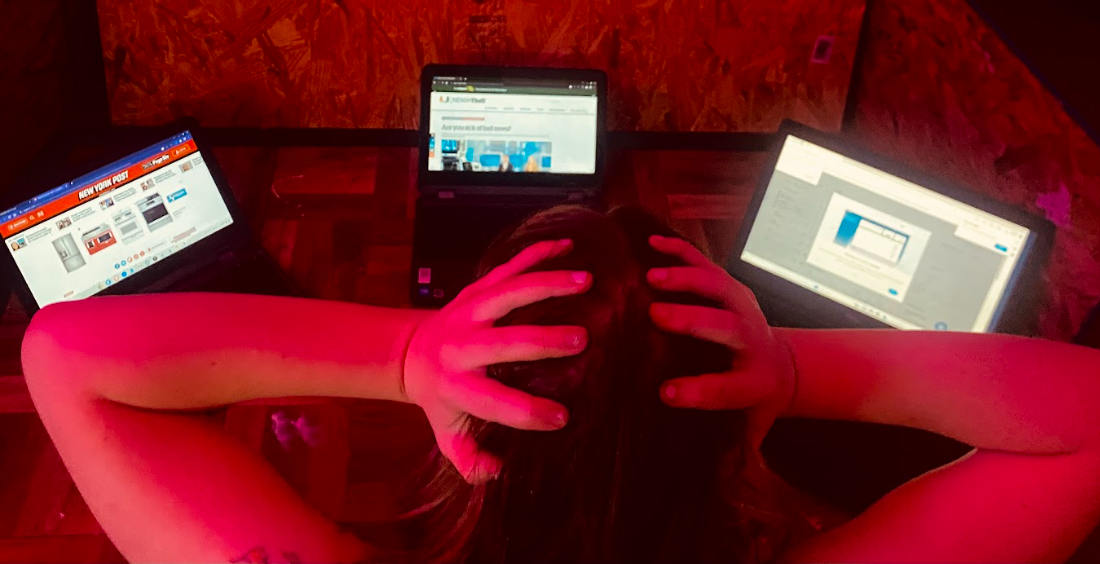The infamous infinite scroll is something every teenager has faced in this generation; scrolling through TikTok, watching seemingly harmless videos out of boredom for hours on end. At least that is how it starts. The fun videos come before clips of tragedies, violence, and what can only be described as traumatizing to young, developing brains. Some may wonder where this issue begins. What is the real root of Gen Z’s mistrust in the media?
It may very well start with overexposure. Teenagers have continuously grown accustomed to the ever-growing social media platform TikTok, a platform where viewers can watch all sorts of content. That includes fun, innocuous videos, but can also include the real-life horrors that teenagers are subjected to. Many teens would rather use social media to kill time than to see all of the stresses that this world can bring. But when watching TikTok and other social platforms, going from fun videos to depressing ones can become exhausting for the teenage mind to handle.
“It’s a buzzkill. I kind of went on there to clear my mind and distract myself from real life,” said Audrey Palacios, junior.
Centennials are living in a world where everything is accessible to them via social media and news services. However, there is a common thread between teenagers and the media. Most teenagers have a level of distrust of the media when it should be a source to understand what’s going on today. Yet, teenagers have continued to express disappointment and tend to be wary of what they see online.
“I don’t believe anything the news says. I believe it’s completely monitored and regulated in ways that they purposely don’t want us knowing stuff, and they purposely manipulate opinions to favor a certain thing,” said Megan Wolny, senior.
However, it is not shocking that people feel this way about the news and news stations themselves. According to rsf.org (freedom of press index) America is ranked number 45 out of 180 countries. The United States doesn’t place in the top ten countries regarding press freedom. This is a contributing factor to the mistrust people are expressing.
“I feel like the news is pretty biased. Each news station has a different perspective,” said Vedant Singh, junior.
The amount of negativity that can be seen due to social media, and the news is a lot for young developing minds to comprehend. Gen Z as a whole, has been exposed to so much due to the chronic internet presence that has been forced upon this generation; and when people see too much of the same topic, they become desensitized to that problem and it becomes normal.
“I do think we are desensitized, just because when you see something so much where you can’t escape it, that’s gonna be the only thing you’re going to think about,” Palacios said.
However, there is also a mental health factor that ties into the root of the issue. Anxiety and depression have only continued to get more light and attention as more people are affected by the issue, and apathy seems to be one of the coping mechanisms that teens use today.
“I don’t like social media. For a long time, it’s made me feel gross. The idea of it– the fact that you can go online and find out anything about anyone within seconds. If I could, I’d get rid of it,” Wolny said.
Social media has a huge influence on society and teenagers. There is often a debate on what the influence is. If it is positive or negative, yet ultimately the truth is, that the influence is both; however, the negative poses a significant impact and is messing with the minds of today.
“You have young impressionable minds listening to this stuff,” Wolny said. “They don’t do their research, some people do and props to them, but some people don’t do their research and it kind of goes off the fact that the news can use all sorts of ethos, pathos, and logos, all of that to lure people in. They use trigger words that entice people to keep reading.”
Ethos, pathos, and logos appeal to credibility, logic, and emotion, drawing you in. The unhinged headlines using the trigger words go into yellow journalism, a crude exaggeration of a story, which is pushing people away from the news and creating the distrust that society has with the media today. This ties into the desensitization and apathy that Generation Z has expressed through the years.
“Social media does desensitize us to a lot of topics that may be heavier to the general eye. I do feel like other external factors play a role, however, with lots of media being published, whether it be factual or not, Gen Z is exposed to a lot of information that can be overwhelming and result in that apathetic attitude,” Wolny said
The whiplash teenagers feel from the constant negativity battling the withering positivity of the internet, continues to control the general public. Media is geared towards specific audiences, creating a bias that people naturally seek. And more often than not, that pushes an increasing number of people away, rather than gaining a larger audience of support.
“Because the media is so directed towards people, that once they see you’re following a trend, they will keep suggesting stuff that feeds into that,” Wolny said.



